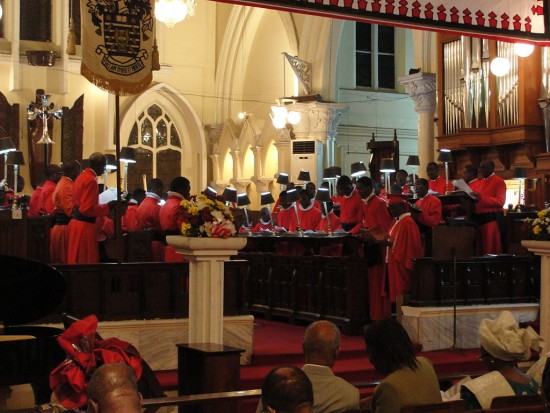West Africa's Prophet Problem
March 7's Wall Street Journal included a rather unusual headline - "Heavenly Currency Intervention Is Sought". If one were to read the article, it would reveal that some in Ghana have taken to the equally unusual measure of praying for the country's currency, the Cedi, to stop falling in value. "I command the resurrection of the cedi - in the name of Jesus!" shouts one pastor, "Archbishop" Nicholas Duncan-Williams.
Of course, the cedi's value is not a function of prayer- rather, it's fall is the result of a rising US Dollar and an economy that has to export even the most basic goods (amongst them, toothpicks and fruit juice), thus consuming valuable foreign exchange reserves; the cedi was redenominated in 2007, loping off four zeros and turning it into one of the world's highest-valued currencies. Since then, however, the cedi has lost more than 60% of its value, sliding from $1.08 to 1GHC down to $0.38 to 1GHC.
But this hasn't stopped the government from joining in the prayer frenzy, indeed it has embraced it (for obvious reasons); one spokeswoman attributed the currency's slide to "dwarfs, the black magic is what has made the cedi lose value." (Such explanations do not suffice for Kwadwo Owusu Afriyie, chairman of the opposition New Patriotic Party, however, who said "ten of Duncan-Williams cannot help [President] John Mahama".)
In Ghana, there are perhaps over three hundred so-called "churches" operating today. The saying goes there is on every street corner either a drinking place or a church. The vast majority of these churches are led by pastors claiming they have powers of prophecy, of working miracles and healing sicknesses- all, of course, untrue.
In Nigeria, the same thing exists, but has been taken to extreme levels by the so-called "prophet" T.B. Joshua, who consorts with presidents and was a public friend of the late President of Ghana, John Atta-Mills, and Joyce Banda, President of Malawi. Duped followers of his "Synagogue, Church Of All Nations" travel from all corners of Africa seeking his help, where they are put up, at their own expense at one of his dozens of lodging houses in Lagos, Nigeria's largest city and home to his headquarters.
One of the pieces of evidence are his famed "prophecies", consisting of after-the-fact videos on Youtube showing blatantly edited and re-cut quotes of a vague nature and overlaid sound tracks:
http://www.youtube.com/watch?v=2uqpUasnnNg
The sad thing about these fraudsters is the millions upon millions of money the extract from these poor countries' pockets. David Oyedepo, with a reported net worth of $150 million, is said to have a fleet of private jets and Rolls Royces. Nicholas Duncan-Williams, the aforementioned "Apostle of Strategic Prayer", drives around Accra in a gaggle of Maybachs (he is reported as saying that he said if jesus was around today, "He would be in a Mercedes"). Overall, the total value of the evangelical churches in Nigeria is said to be around $60 billion dollars. In Ghana, a country perhaps an eighth of the size of Nigeria, that sector is said to rake in a billion dollars annually, perhaps two, no one knows for sure.
This great fleecing of these countries requires action from the people and governments to stop this fraud. These phonies should be publicly tried, exposed, and sent to jail, to their last, and their assets seized and used for national development.
But that is not to say that religion has altogether been a losing deal for the people of the region In contrast, 95% of the top performing secondary schools, in Ghana, are Catholic schools. In several regions in Ghana a majority of health services are provided by Catholic hospitals. The Catholic Church and other positive institutions have a massive potential to promote economic reform and development in these countries.
With the rise of Nigerian Cardinals Francis Arinze and John Onaiyekan, and the Ghanaian Peter Turkson, and Pope Francis' message of social equity and progress, it is clear other institutions offer a message of self-empowerment and advancement that presents a far superior alternative to the chicanery of the present posse of pastors. If they seek to lead, the leaders in these nations should declare a war against these abusers of the name of God, for the well being and sake of their people, instead of consorting with them.

